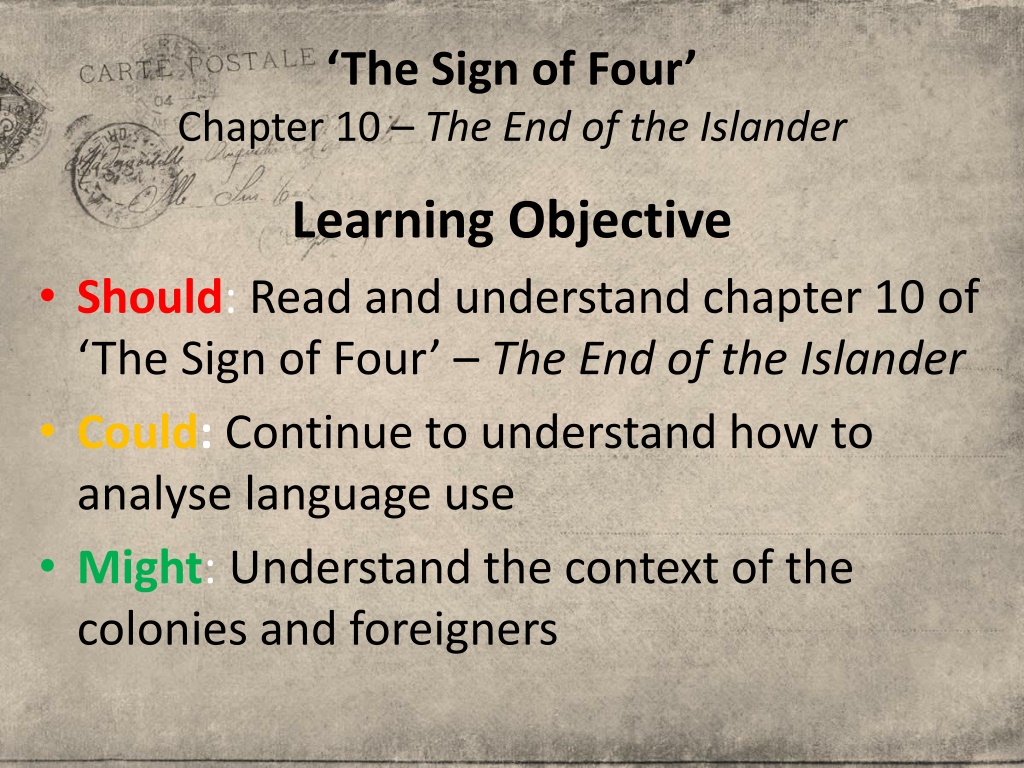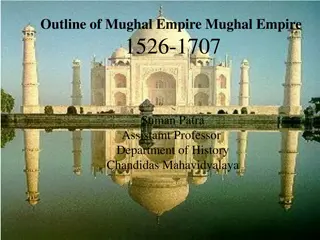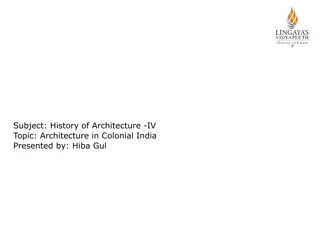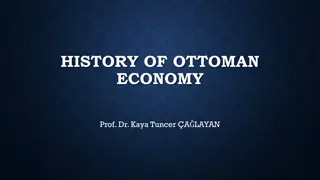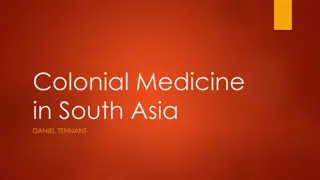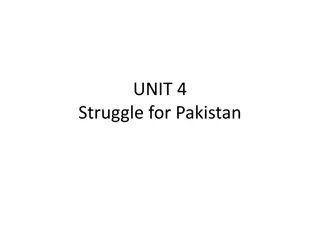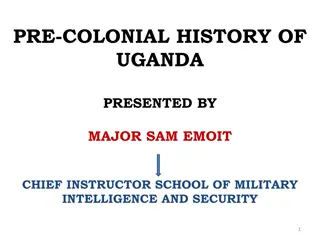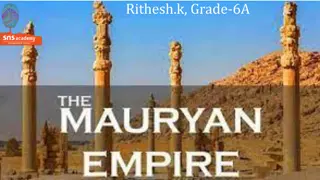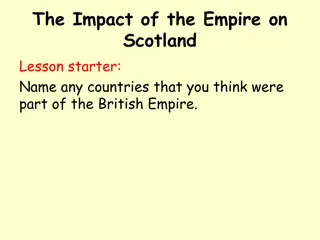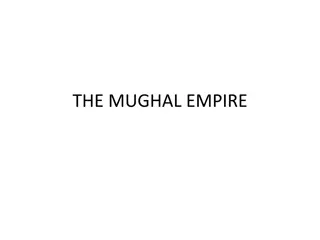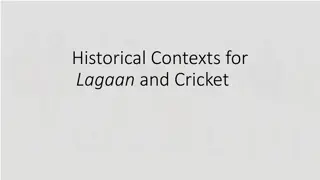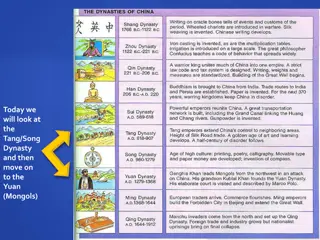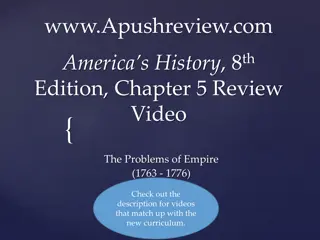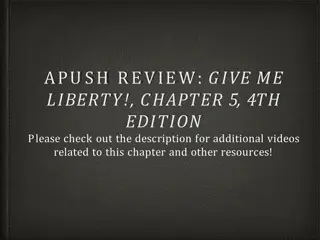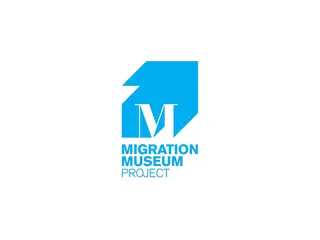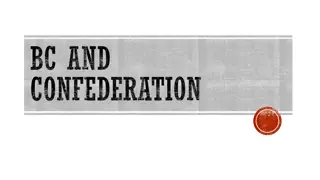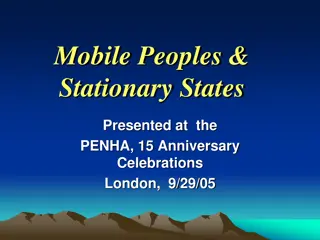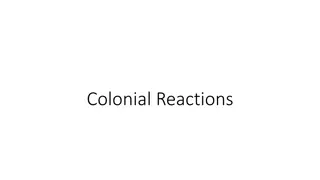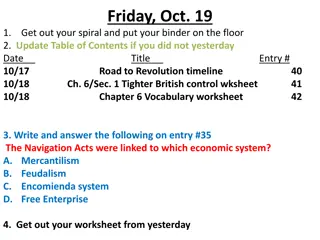Colonial Influences and The British Empire
The British Empire once ruled over vast territories, including parts of North America, India, and Africa. European countries colonized other nations to expand trade and acquire resources. Colonization ceased in the 20th century due to moral objections and independence movements in colonies. The spread of the English language has been a significant cultural legacy. Understanding the context of empire and colonization sheds light on perceptions of foreign nations by the British in the 19th century.
Download Presentation

Please find below an Image/Link to download the presentation.
The content on the website is provided AS IS for your information and personal use only. It may not be sold, licensed, or shared on other websites without obtaining consent from the author.If you encounter any issues during the download, it is possible that the publisher has removed the file from their server.
You are allowed to download the files provided on this website for personal or commercial use, subject to the condition that they are used lawfully. All files are the property of their respective owners.
The content on the website is provided AS IS for your information and personal use only. It may not be sold, licensed, or shared on other websites without obtaining consent from the author.
E N D
Presentation Transcript
The Sign of Four Chapter 10 The End of the Islander Learning Objective Should: Read and understand chapter 10 of The Sign of Four The End of the Islander Could: Continue to understand how to analyse language use Might: Understand the context of the colonies and foreigners
Starter answer the following questions in full sentences. British Empire The countries ruled by Britain starting in the late 15th century until a peak around 1920 when the British Empire included around a quarter of the world's population. British colonies (= places taken over by a foreign country and settled by people from that place) included parts of North America, islands in the West Indies, India, Australia, New Zealand and several countries in Africa. Many of them became colonies at a time when several European countries, including Britain, France, Spain and the Netherlands, were competing for trade around the world and for new sources of raw materials. Most of these colonies became independent during the 20th century, when it was generally recognized that it was not morally acceptable to take over other countries and exploit them, and many colonies had growing nationalist movements for independence. Through the Commonwealth many of the countries still have political and economic links with Britain. Perhaps the most important and lasting cultural influence of the British Empire has been the spread of the English language which is still either an official language or taught as a second language in many countries. 1. What countries were part of the British Empire? Why did European countries want to colonise other countries? Why did countries stop colonising other countries? What has been possibly it s most important influence? 2. 3. 4. Language Alert! Colonisation - to settle among another area and take control
Empire a group of states or countries ruled over by a single monarch Language Alert! Looking at the definition of Empire and the map which shows all the countries that Britain had colonised, what do you think the typical British person in the 19th century thought about foreign countries and the people that lived there?
Look at the book Holmes reads to Watson in Chapter 8 He stretched his hand up, and took down a bulky volume from the shelf. "This is the first volume of a gazetteer which is now being published. It may be looked upon as the very latest authority. What have we here? 'Andaman Islands, situated 340 miles to the north of Sumatra, in the Bay of Bengal.' Hum! hum! What's all this? Moist climate, coral reefs, sharks, Port Blair, convict-barracks, Rutland Island, cottonwoods Ah, here we are. 'The aborigines of the Andaman Islands may perhaps claim the distinction of being the smallest race upon this earth, though some anthropologists prefer the Bushmen of Africa, the Digger Indians of America, and the Terra del Fuegians. The average height is rather below four feet, although many full-grown adults may be found who are very much smaller than this. They are a fierce, morose, and intractable people, though capable of forming most devoted friendships when their confidence has once been gained.' Mark that, Watson. Now, then, listen to this. 'They are naturally hideous, having large, misshapen heads, small, fierce eyes, and distorted features. Their feet and hands, however, are remarkably small. So intractable and fierce are they that all the efforts of the British official have failed to win them over in any degree. They have always been a terror to shipwrecked crews, braining the survivors with their stone-headed clubs, or shooting them with their poisoned arrows. These massacres are invariably concluded by a cannibal feast.' Nice, amiable people, Watson! If this fellow had been left to his own unaided devices this affair might have taken an even more ghastly turn. I fancy that, even as it is, Jonathan Small would give a good deal not to have employed him." Which part of this do you think a modern audience would find shocking? Why? Do you think that an audience at the time would be as shocked? Why?
The End of the Islander As we continue to read make sure you: Listen carefully Use your glossary to check any key words as we go along Put your hand up and ask if there are any extra words we need to add to our glossary Read to: Yes, it is your boy, I cried. I can see him plainly.
Could: Continue to understand how to analyse language use As we read the next section consider how Conan Doyle has used language to create tension.
The End of the Islander As we continue to read make sure you: Listen carefully Use your glossary to check any key words as we go along Put your hand up and ask if there are any extra words we need to add to our glossary Read to: I caught one glimpse of his venomous, menacing eyes amid the white swirl of the waters. (mid paragraph)
Tonga The character of Tonga has been described so far as part of the smallest race upon this earth and fierce, morose, and intractable (chapter 8). Think pair - share How is he represented in the following passage? How does Conan Doyle use language to present him in this way?
At the sound of his strident, angry cries there was movement in the huddled bundle upon the deck. It straightened itself into a little black man the smallest I have ever seen with a great, misshapen head and a shock of tangled, dishevelled hair. Holmes had already drawn his revolver, and I whipped out mine at the sight of this savage, distorted creature. He was wrapped in some sort of dark ulster or blanket, which left only his face exposed; but that face was enough to give a man a sleepless night. Never have I seen features so deeply marked with all bestiality and cruelty. His small eyes glowed and burned with a sombre light, and his thick lips were writhed back from his teeth, which grinned and chattered at us with a half animal fury. "Fire if he raises his hand," said Holmes, quietly. We were within a boat's-length by this time, and almost within touch of our quarry. I can see the two of them now as they stood, the white man with his legs far apart, shrieking out curses, and the unhallowed dwarf with his hideous face, and his strong yellow teeth gnashing at us in the light of our lantern. It was well that we had so clear a view of him. Even as we looked he plucked out from under his covering a short, round piece of wood, like a school-ruler, and clapped it to his lips. Our pistols rang out together. He whirled round, threw up his arms, and with a kind of choking cough fell sideways into the stream. I caught one glimpse of his venomous, menacing eyes amid the white swirl of the waters.
The End of the Islander As we continue to read make sure you: Listen carefully Use your glossary to check any key words as we go along Put your hand up and ask if there are any extra words we need to add to our glossary Read to: the end of the chapter
Plenary 1 https://www.youtube.com/watch?v=taYX2CxT OZg&list=PL250E610B423A5609&index=8 (from about 4 minutes) https://www.youtube.com/watch?v=t23bJ8La DbM&list=PL250E610B423A5609&index=9 (to about 4 minutes)
Plenary 2 Look at the learning objectives for today s lesson write 20 words on what you have learnt today about each.
The Sign of Four Chapter 10 The End of the Islander Learning Objective Should: Read and understand chapter 10 of The Sign of Four The End of the Islander Could: Continue to understand how to analyse language use Might: Understand the context of the colonies and foreigners
Homework Should: Complete chapter summary for chapter 9 (and get any up to date that are missing) Could: Find the most important quotes from chapter 9 and add them to your summary. Might: Explode these quotations.
